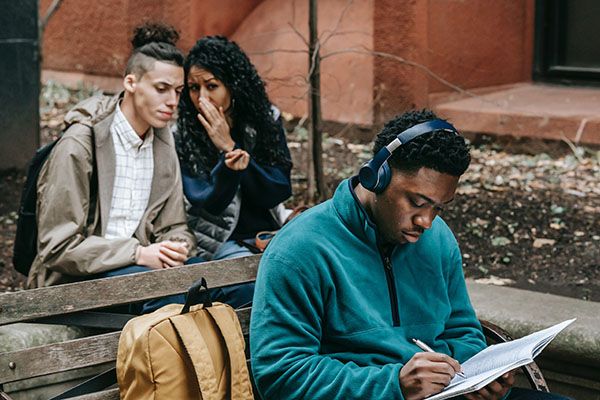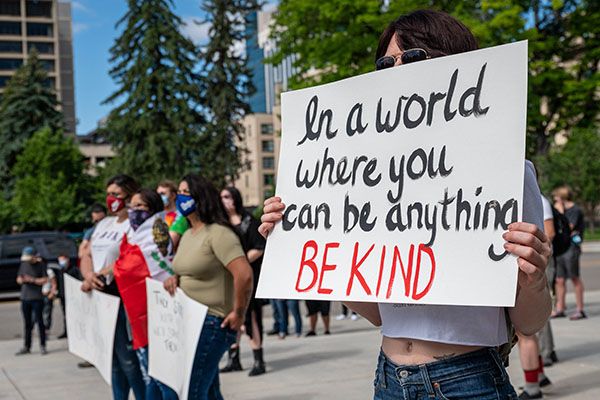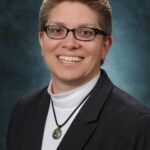Welcome back to the Healing Pain Podcast with Karla A. Bell, PT, DPT, GCS
Each year in June, I do one key episode related to LGBT health equity and highlight the work of one guest or one speaker who’s doing important work in this area. To begin this episode, I’d like to share seven stats related to LGBT health equity and why the work of our guests is important. More than 50% of LGBT people experienced some form of healthcare discrimination. One in five transgender people has been denied health coverage simply because of their trans status. LGBT people of color are more than twice as likely to avoid the doctor’s office than white LGBT individuals. Seventy-five percent of lesbians report delaying or avoiding healthcare. A 2015 study reported 80% of first-year medical students express implicit bias against getting lesbian people and 50% expressed explicit bias. LGBTQ Youths are five times as likely to have attempted suicide compared to heterosexual youth. 2021 marks the highest number of LGBT anti-transgender bills in the history of the United States. Over 90 anti-transgender bills have been introduced in the 2021 state legislative session.
The concept of health equity means that everyone has a fair opportunity to be as healthy as possible. As we reflect back on those seven stats, I asked you as a healthcare practitioner, does the LGBTQ community have this fair opportunity? Are we doing enough to support this community, not only in pain care but in the promotion of overall health and well-being? My guest is Dr. Karla Bell. She is an Associate Professor of Physical Therapy and Co-Director of Clinical Education at Thomas Jefferson University. Dr. Bell serves as Co-Chair of the PT Proud Committee through the Health Policy Administration of the American Physical Therapy Association and is the recipient of their 2021 Public Policy Maker Award. Dr. Bell is pursuing her PhD in Public Health Sciences focusing on LGBT health equity and is a part of three active educational research projects around sexual and gender minority education and the patient experience. This episode is about how we can promote LGBT health equity and well-being. This episode has applications for both physical health as well as mental health professionals. Without further ado, let’s begin and let’s meet Dr. Karla Bell.
—
Watch the episode here:
Subscribe: iTunes | Android | RSS
Promoting LGBT Health Equity And Wellbeing: Applications For Physical And Mental Health With Karla A. Bell, PT, DPT, GCS
Karla, welcome to the show. It’s great to have you here.
It’s nice to have nice to be here. Nice to see you.
Happy pride.
Happy pride.
It’s June. Every year I do at least one episode on LGBTQ+ topics. They are important in the greater context of society. They have so many intricate connections to health, both physical and mental health. As PTs, this is everything we’re talking about nowadays. People know some details from your bio that I read, but a small detail that people don’t know about you is you’re a full-time professor at Thomas Jefferson University in the DPT program there. You’re training lots of great new DPTs and you’re also finishing up your PhD in Population Health. You have a focus on some of this LGBTQ information in there. Talk to us about that. Population health is a big topic. How do you whittle it down into that important topic?
I have been kicking around pursuing my PhD, but more of the traditional senses of PhDs and physical therapy didn’t necessarily completely jive with my interest areas and passion. When I moved to Jefferson 3.5 years ago, I was already in this research area with Melissa Hofmann who’s a co-PI and the Principal Investigator of one of the research studies. I realized that their population health program jived much better with the direction that I was going into in sexual and gender minority health, and around the areas of intentionality in our behaviors as healthcare providers and educators, and how they shape the healthcare experiences of these populations. I’m on the health behavior track in population health. I’m interested in education as an intervention to shape behavior to have an impact on healthcare disparities.
When you say education as intervention, is that from the university side or the public health side or both?
It’s both but right now, one of the research studies that I’m doing is around a Faculty Development Program that’s looking at education and training as an intervention to faculty to improve the way they educate and practice in the clinic to make the healthcare experiences of these communities better.
Talk to us about equity for this community and what that means? What’s potentially missing? What do people not realize?
Probably many folks may not know this, but 2021 in the United States is the worst year on record for anti-LGBTQ+ legislation in our country. This is a milestone that I didn’t think we would ever hit. It is 2021 and we were going in a very positive direction for equity for our communities and populations. There are eighteen anti-LGBTQ laws that have been enacted into law in 2021. That’s more than the last three years combined. Many are still pending and in process.

There are over 275 bills across the country in some form, so why the focus on LGBTQ+ equity in the US? These populations already have staggering health care and health disparities that exist. Research on physical activity in our profession focuses on movement and physical activity, while research for these populations in that area and disparities is very limited. We do know some sub-communities have worse physical activity outcomes than non-LGBTQ+ communities. These social determinants of health, when we’re talking about this state day in our country right now, the focus on legal rights specifically are critical for healthcare providers to understand these communities. These anti bills push the care and equity of these populations further in the wrong direction. That’s why the focus on this, specifically with the legislative part of the social determinants of health weighing heavily at the top.
We went from marriage equality being such a big win and a big celebration. Things were steamrolling in one direction. The past administration may have changed some things. I like talking about social determinants of health more and more because it helps give people a bigger picture than just the individual. As therapists, we are very focused on the individual who comes into our practice. We evaluate and treat them. We’re moving toward individualized and personalized care. There are all these other factors that are happening on the outside that you might not see and how they impact a community, specifically the LGBTQ in this community in this sense. What does a physical therapist need to know with regard to those social determinants? When they’re treating a patient and reaching out to people in their community, what should they be aware of?
The legal parts of the social determinants of health are critical. Eighty percent of someone’s health status is directly correlated to these social determinants of health. It’s like economic quality, stability, neighborhood and built environment, education access in quality, healthcare and access in quality. All of that stuff is considered the social determinants of health. That means when populations don’t have equal legal rights like these populations, everything else dominoes into those social determinants of health. They’re impacted. Their economic stability, access to stable environments, protections, the public social stigma attached to these are impacted. The other thing that’s important to note is for us to truly understand the experiences of these communities when they’re seeking our health. Some of them are even afraid to seek our help, even seek physical therapy because of fear of discrimination or fear of feeling like they’re going to be comfortable in your clinic.
Do you have all-gender bathrooms or do you only have binary bathrooms? Are there places where they can feel comfortable changing? All of that stuff comes into play. The stigma associated with these populations when we’re legislating and politicizing their lives every day in the media around these bills, that impact is hard to measure. It has a very real impact on people’s health and well-being. The people think that there’s something wrong because now we’re having bills and laws explicitly excluding some people from something and that has a measurable impact on quality of life. One of these is raising the awareness of physical therapists. Many physical therapists don’t even know that this is going on in our country.
There are laws now dictating that transgenders can go to the bathroom or access public places. Tennessee passed a bill where if you’re a business, you have to alert everybody that you will serve transgender people. That’s in the United States. This does incredible harm to one’s sense of self, mental health, quality of life and well-being, to say a few things. As physical therapists, through our behavior and how we clue in people to our inclusivity and welcoming environments, we matter to these populations. Those are through our inclusive practices, our knowledge base, how we engage with folks, respect their families, their pronouns and who they are. All of that knowledge and training can signal to a person that, “I’ll come back to this place and get the care that I need or I’m not going back to that place.” Now their physical activity goes down. The reason why they came to see you, they’re not going to get treated for. Something else is going to happen. We all know the sequella that happens from that. There are lots of reasons that we need to know as physical therapists.
I want to talk to you about some of your research. I know it’s not published yet, but there are some themes that you can talk to us about and a couple of papers that you have coming out. I want to talk about our profession, which is a bigger topic, but let’s talk about your research first. You have a couple of papers. Share some of the themes that you’re seeing develop in that research.
The first research study that I’m part of with Melissa Hofmann who’s co-chair of PT Proud with me and a bunch of other folks, Chris Condran and some other folks from Regis University, we’re looking at the barriers in physical therapy for sexual gender minority communities. It’s a staged research project. We did over 100 focus groups for clinicians to look at their perspectives in treating these communities. That is the paper that is going to be in the draft and coming out. That’s the first stage. We’re looking at the thematic analysis from that. It showed some highlights of almost a complete gap in education in our DPT education and our PTA education for future providers coming out in this area. It’s saying that they didn’t know anything about these communities. Therefore, if they were contributing unintentionally to disparities by disrespecting or not being inclusive in any way, that was a big theme.
You interviewed physical therapists about their knowledge base around LGBTQ+ communities and how they interface with them.
Yes. Our focus group questions were around what they were aware of about these communities? How comfortable did they feel treating these communities? A bunch of focused questions around those themes.
Did those questions focus on what they learned in school as well?
Our questions are focused on not only what they learned in their education as getting to be PTs, but also on their continuing education or their employer education or whatever happens since they’ve been in school. What we’re finding is it’s not just a gap in professional education and entry-level education, but it’s a gap in continuing education as well.
There’s limited knowledge there for physical therapists entering into the field to take care of these populations in an equitable way.

That was one. Two is interesting. Some themes are coming out about trying to voice how this belongs in our profession, in what categories, and some folks think it’s a political discussion versus a health discussion. It’s around some of the politicization of these communities that negates the real impact on their lives of things going on. The other things that came up are around PT’s role as teachers in the clinic to other students, working with students who belong to these communities, and also the lack of awareness of the legal status of these communities. It’s not just the unique needs of health and a global lack of understanding of terminology for these communities. What goes into the quality of life? What is quality of life means for these communities? What are the considerations there, even the social determinants of health not realizing the staggering disparities that exist in economic stability, even food insecurity in some regions for these communities, all kinds of things?
You’ve already done a lot of work speaking on the national and state levels even before your research has come out. You’re sharing this on social all the time. You’re speaking at CSM. You’re speaking at state conferences. What type of information are you sharing? What’s the feedback and the questions that our professionals or colleagues are asking you?
That’s a great question that leads me into the second research study that I’m involved in. I’m part of an interdisciplinary educational research team at Jefferson with three OT colleagues and myself. We’ve created a seven-month-long comprehensive sexual and gender minority education and training faculty clinician development program that’s completed its second year. We’re hoping to publish our findings in our first year as a pilot. We got funded and expanded. We had about 40 participants from across the enterprise of Jefferson. We had physicians, nurses, physical therapists, occupational therapists and athletic training. It’s not just healthcare providers. We also had architecture and fashion design because our campuses are meshed. What we found out with that development program, because we do pre-post data collection on validated surveys around this content, is that folks are thirsty for this information. It’s structured around inclusive practices. It’s structured around social determinants of health and also student success, patient success when they’re trying to engage into the healthcare system.
What we’re finding out is people are seeking out this information because nobody’s had it. We have physicians who’ve been practicing for 30 years in this program going, “This is amazing because I wish everybody had this information.” Folks are asking for one, basics 101 about terminology and being able to respectfully engage and understand when certain terms are used with these populations and what they mean to these populations. Two, how to engage in inclusive practices and set up a warm environment that when somebody from our communities walks in, we know it’s going to be an okay experience. We can let our guard down a little bit and be ourselves, and share what we need to share about our health status so we can get the best care that we need and not hide anything.
That oftentimes happens with our communities. There are lots of information left out, either from social support or all other questions that go along with what you need to share with your healthcare providers like your sex life and important things that if we don’t share, then we don’t get the care we need. Those are the things. Also, what folks are finding in this education and training program is that they’re able to process. They’re able to strategize on things that are coming up already. They are talking about students they’re working with. If they don’t know how to troubleshoot and come up with the best way for that student to be successful, it is because of these identities. Somebody comes in and shares that their parents kicked them out of their house. The faculty members who sit there with their jaws open want to be responsive in a sensitive way and be able to offer them the resources that they need. Also, the patient who shares that they lost their job because of their identity, and all of those things that are the realities for patients and people every day in this country.
Do you find that when people learn about the information that you’re teaching them, they’re a little bit shocked there’s such adversity out there for that group?
They are very shocked. This is not necessarily well-known.
They think the opposite that their life is easy in a certain way. I’ve heard people say those types of things too.
What I can share is even in this program, when we were winding up in May and I was sharing the status of these legislative bills, there were people in the room who were crying because they didn’t realize this was going on in our country. That tells you how hidden this is from the media coverage or how little is the true impact of what is shared with the public.
The people don’t realize the amount of suffering covered up in these communities.
The intersections if you’re a black transgender female in our society. We had what looks like to be at least the 25th death and it’s a real crisis. If we want to talk about intersections and compounding identities and disparities, intersectionality needs to be at the top.
Has the APTA, American Physical Therapy Association, done enough? They can’t do everything but I wonder if they should have stepped up to the plate a little bit sooner on topics such as this. There are things like delicate statements and positions that they can make on certain topics.
There’s a very robust conversation going on in the House of Delegates thread right now around an anti-discrimination motion. I posted a personal statement on this topic area and talking about framing the conversation back to impact on these communities and why this conversation needs to continue. Also, bringing it back to our core values and our profession. We talk about social responsibility, care and compassion, caring for others, altruism and all of those things. If we’re living our core values, which we all like to put out on social media that are very important to us, that needs to put to action.

It’s interesting because I bring up this concept of organizational social justice instead of social responsibility. That concept moves us from a passive approach of social responsibility saying, “I agree with that.” There’s no obligation to act. There’s no obligation to put that effort forward. Social justice aligns with and requires us to align our internal behaviors with our external behaviors and our core values. That’s what that framework does. We as professionals need to be living through that framework rather than just social responsibility.
When you say social justice, that fits well with the association’s mission around improving society. The top line is that we improve society in some way. How can we improve society if these groups don’t have equitable means in the United States? What would you like to happen in DPT education? You’re so close to DPT education both with being a full-time professor as well as having a PhD in population health. What would be a significant step for you to see happen in 2022?
In 2019, I published a journal article on the part of the solution to address some of the disparities in these communities and that is inclusive education. I put out a roadmap for rehab professional education OTPT, with an outline that matches the American Medical Associations’ Publication in this area, and reframed some of their domains of education to our domains of education. We need to be making sure our educators are inclusive in their teaching practices and their teaching content. What that looks like is everybody make sure that the case studies that we use and the patients we’re talking about represent the society that we live in.
It’s not all this generic like 83-year-old female, doesn’t have a race, doesn’t have a sexual orientation, doesn’t have a gender identity. We don’t know what the pronouns are. You said female so we assume the pronouns are she and her, but we didn’t go through the process of being patient-centered about not making that assumption. What do we do when we read that case? Some of this stuff is on the shoulders of our educators first and that’s why we put this Faculty Development Program together. I wanted to mention that we’re looking for ways to open up the Faculty Development Program beyond Jefferson in 2022. Hopefully, we’re going to be able to do that because it doesn’t exist anywhere else in the country.
There are various workshops that you can go to but nothing like this. What I would like to happen in our professional education is that the people take a DEI lens to their classes. Even if our association creates a checklist of how to be inclusive, how to pour through when you’re revamping your course differs from the checklist. You need to make sure your syllabus is gender-neutral. You also need to make sure that you’re not making assumptions about your students in your class. How do you set up a brief conversation so students can speak out? Are you asking? Are you being equitable in your classroom, to begin with? Are you asking certain people more questions than others? Are you asking the same level of questions? All of that biased stuff that happens with us because of who we are, we need to take a deeper dive as educators because we’re the responsible parties. I want to see that education takes an accountability check to its educators first in this area.
This will be a more difficult and unpleasant question probably for people to think about. Do we ever need evidence that there’s some built-in discrimination in PT programs, knowing that there’s some built-in discrimination in our society? Some of that may have trickled into the university mission or university education, then maybe eventually into a DPT program. You might have LGBTQ individuals in programs right now that are up against some significant adversity.
The second stage of the research study I was talking about that we talked to clinicians first is we’re talking to faculty and students. What we’re finding out in the middle of what’s going on right now are some of the things you referred to. There are some staggering things going on in our programs that get pushed aside, get put under the table, get ignored and not dealt with in a very inclusive way at all.
I know you and your colleagues started the whole Pride initiative within the association so there’s a place for people to find like-minded individuals and to have a place to go.
These past several months have expanded. We have very active task forces now. We have quarterly member meetings. Every time there are more people there so it’s nice to see.
Have you had the opportunity to mentor any SPTs or Student Physical Therapists who reached out to you and said, “I have some challenges. I’m glad you’re here and you’re producing some information around this.”
I would say that several of us in the leadership of PT Proud probably interact almost weekly with students from across the country in various ways. It’s very clear that there is a gap that these students don’t feel like they have someone in the program that they’re in to talk to, and they reach out to us.
You’re all fast becoming mentors. It’s been a few years.
PT Proud has been around since 2018.
Where can people go to find information about PT Proud?
HPA is hosted under the Global Health SIG in the Section Health Policy Administration, which is going to be a new name very soon. You can go to PTProud.org. That’s our website. You can also find us on Facebook. We are also on Twitter, although that has not been as active, it’s going to get active again. When you look us up on Facebook, you can put in a request for information or be contacted or if you want to get involved. On the website, there’s also a Contact Us button that you can add your information into and we’ll get back to you.
I know you’re going to be finishing up your PhD soon. We’re all behind you and rooting for you to finish up strong.
Not soon enough.
In the interim, how can people learn more about you and stay in touch?

Thank you. The people can find me at Thomas Jefferson University. Google me Physical Therapy Department. You can email me at KarlaBell@Jefferson.edu and that’s how folks can find me.
You also have a Twitter handle.
I do @PassionatePT.
If you are an educator in a DPT program or any other healthcare program or a PT or another health professional, make sure that you share this information out with your colleagues so they can learn more about equity in the United States for these types of populations. I want to thank Karla for being with me for the special edition. We’ll see you next time.
Thank you so much.
Important links:
- Thomas Jefferson University
- PTProud.org
- Facebook – PT Proud
- KarlaBell@Jefferson.edu
- @PassionatePT – Twitter
About Karla A. Bell, PT, DPT, GCS
 Karla A. Bell, PT, DPT, GCS is an Associate Professor and Co-Director of Clinical Education at Thomas Jefferson University Physical Therapy. Dr. Bell serves as a co-chair of the LGBTQIA+ PT Proud Committee through the Health Policy Administration of the APTA and is the recipient of their 2021 Public Policy Maker Award.
Karla A. Bell, PT, DPT, GCS is an Associate Professor and Co-Director of Clinical Education at Thomas Jefferson University Physical Therapy. Dr. Bell serves as a co-chair of the LGBTQIA+ PT Proud Committee through the Health Policy Administration of the APTA and is the recipient of their 2021 Public Policy Maker Award.
She presents/facilitates discussions at the local, state, and national levels for multiple health professions including nursing, occupational therapy, medicine, and communication disorders, and has provided on-site seminars and workshops for health systems and campus faculty/staff on the topics of intersectional cultural humility recommendations for best practice care and health profession education.
She is currently part of three active educational research projects around sexual and gender minority education and student/patient experience in the healthcare professions. Bell is pursuing her PhD in Population Health Sciences to help inform her research in this area and is a member of Academy Health, GLMA, American Physical Therapy Association.
Love the show? Subscribe, rate, review, and share!
Join the Healing Pain Podcast Community today:
